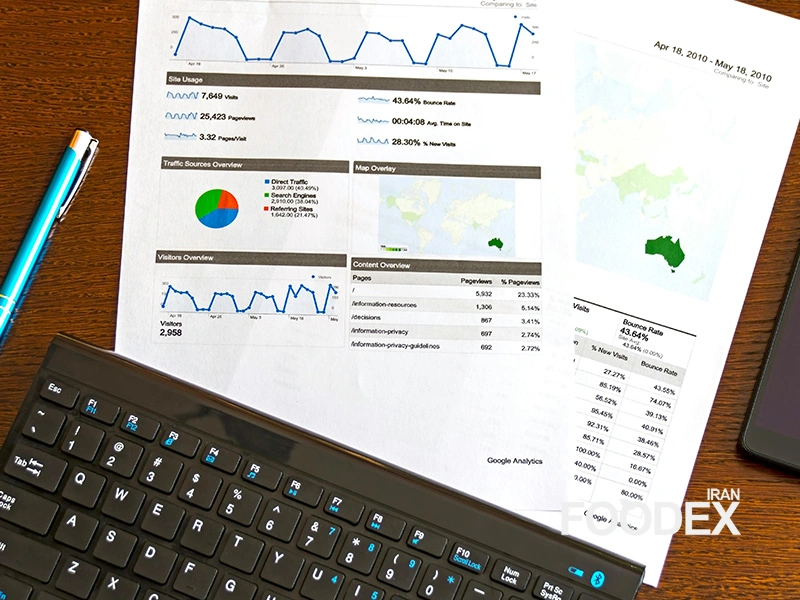Net Supply chain analysts are essential drivers in modern industrial operations since this extensive sector reacts profoundly to market changes, temperature conditions, and product expiry deadlines alongside health-related requirements. Analysts working in the supply chain make choices that directly lead to managing raw material inventory while affecting production timing, costs, and transportation systems to achieve customer satisfaction.
This Foodex Magazine article analyses the entire scope of supply chain analyst responsibilities for the food sector and applies its findings to genuine food enterprise situations.
Data Analysis and Process Optimization in the Food Supply Chain
Supply chain analysts must analyze large volumes of data to reveal significant trends and patterns, maximizing food production while improving delivery and storage operations.
Example: Optimizing Delivery Routes for Food Transportation
McDonald’s launched sophisticated machine learning software in 2020 to minimise the expenses related to raw material distribution procedures for its restaurant network. The recommended system used traffic condition information to find the best delivery paths that minimised fuel usage while offering optimised delivery periods.
McDonald’s reduced overall transportation expenses by 5%, simultaneously increasing the speed of raw materials to restaurants, which preserves food freshness.
Supply Chain Network Design
A supply chain network design’s critical function is to optimise transportation and distribution activities.
The primary duty of supply chain analysts involves designing a resourceful system that connects food product sourcing with manufacturing and delivery functions, minimising expenses during speedier customer fulfilment.
Example: Coca-Cola’s Warehouse Restructuring
Coca-Cola enhanced product delivery speeds by introducing smaller regional warehouses instead of big central ones. The management transition reduced transportation expenses, and products reached different markets swiftly.
According to this initiative, distribution expenses decreased by 15% as customers received their beverages more rapidly.
The History of Supply Chains: From Ancient Times to the Modern Era
Learn MoreSupplier Management and Quality Control in the Food Industry
Supply chain analysts perform supplier analysis to guarantee the quality of raw materials and the efficiency of supply system operations.
Example: McDonald’s Strategy for High-Quality Raw Material Sourcing
McDonald’s established an evaluation process to rate suppliers according to product quality, performance, and regulatory compliance. Suppliers who achieve poor evaluations trigger contract assessments and potential contract-ending processes.
The supply chain experienced improvements regarding raw material quality, which reduced health-related challenges.
The Role of Analytical Techniques in the Food Supply Chain
Organisational success through supply chain enhancement relies on using different analytical tools that analysts deploy. The most important set of techniques includes:
ABC Analysis
The ABC analysis system groups inventory products into three categories according to their criticality and worth.
Class A: The supervision requirements for this category are high because these high-value items have low sales volume.
Class B: Medium-value items with moderate sales volume.
Products within Class C need minimal supervision because they consist of low-priced yet high-selling items.
In a Dairy’s classification scheme, high-demand products (milk and yoghurt) are classified under Class A, whereas seasonal items (specialty ice creams) are classified under Class C.
EOQ Model (Economic Order Quantity)
The model measures how to determine the best order size that minimises storage expenditure and purchasing costs.
Demand Forecasting Analysis
Customers in analysis teams apply market trends, historical sales information, and forecasting calculations to determine upcoming market needs.
Risk Management and Crisis Planning in the Food Industry
Industrial demand forecasting helps a juice manufacturer boost orange juice output during summer and apple juice output during winter.
Food Industry entities need proper risk management strategies coupled with crisis planning approaches.
Analytical experts must predict diverse circumstances and prepare contingency plans for market sanctions, raw material cost alterations, natural disasters, and market shift fluctuations.
Example: COVID-19 Crisis and Its Impact on the Food Supply Chain
Multiple food companies encountered problems obtaining their required raw materials during the pandemic. The crisis prompted Nestlé to find new suppliers while building strategic stock in its warehouse locations.
The strategic actions of Nestlé allowed the company to maintain its inventory supplies, which stopped its sales from decreasing.
Business operations use technological advancements to advance their food supply chain functions.
Leveraging Technology to Improve the Food Supply Chain
Implementing artificial intelligence, blockchain, and Internet of Things (IoT) technologies in systems can help analysts improve the efficiency of supply chains.
Example: Walmart’s Use of Blockchain in the Food Industry
Walmart deployed blockchain technology for food tracking purposes. Thanks to this system, all food products could trace their journey from the farm to the store in real-time throughout the seconds.
The method brought increased monitoring capabilities, which successfully combated fraudulent food practices.
How to Become a Supply Chain Analyst?
A Comprehensive Guide to Entering and Advancing in This Field
The job of supply chain analysis provides opportunities for people who want to explore data processes along with strategic contributions through decision-making processes. Most people wonder which initial approach will work best for them. Do I need a relevant degree? Does a person require specific education to start a career in this field?
The supply chain profession can be accessed through various educational and professional entry points. Belief in the possibility of career growth at any stage through proper planning will lead to advancement.
This guideline reviews all available educational paths and practical training steps to help you identify your most suitable career path.
Academic Education: Is the University Path Right for You?
Most people gain access to supply chain analytics through university studies in relevant academic fields. This pathway offers several advantages:
Benefits of a University Degree in Supply Chain Management:
Deep understanding of supply chain concepts, logistics, and data analysis
Academic learning conforms to organised institutional standards combined with the latest academic materials.
Students can participate in internships and networking activities with professors and companies.
Students gain access to research facilities and specialised programs that assist their work.
The educational system provides specialised advanced research opportunities, including demand forecasting models and blockchain in supply chains.
A university education would be optimal for people who want to study theories and conduct research. This paper discusses the top academic disciplines and the leading universities worldwide in this subject area.
Best University Majors for Supply Chain Analysis
Three academic areas exist that will lead you toward a supply chain career:
Core Major Programs directly match Supply Chain Management principles.
These educational programs have been established primarily for supply chain management research and analysis.
- Supply Chain Management
- Logistics Management
- Operations Management
Complementary Majors (Focused on Data Analysis and Technology)
The fields deliver data analytical and technological capabilities necessary for supply chain analysis.
- Industrial Engineering
- Data Science & Analytics
- Systems Engineering
- MBA with a Supply Chain Concentration
- Computer Engineering (for supply chain systems analysis and software development)
Key Differences Between Traditional Trade and Supermarkets
About Modern Supply ChainTop Universities Worldwide for Supply Chain Management
If you are considering studying abroad, here are some of the world’s top-ranked universities in this field:
| Global Ranking | Country | University |
|
#1 in Supply Chain Management |
USA | MIT (Massachusetts Institute of Technology) |
| One of the best in Supply Chain | USA | Michigan State University |
| MBA with Logistics Concentration | USA | University of Pennsylvania (Wharton) |
|
#1 in Europe for Supply Chain |
Netherlands | Erasmus University (Rotterdam School of Management) |
| Specialised Supply Chain Programs | UK | Cranfield University |
| Top in Asia for Logistics Management | Singapore | National University of Singapore (NUS) |
Achieving Supply Chain Certifications is a clear path to entering this field (Alternative Entry Route).
What Do Supply Chain Certifications Signify?
International certifications prove your supply chain analytics expertise to attract potential employers seeking career opportunities without a university background.
Benefits of Supply Chain Certifications:
The training in multiple certifications delivers actual skills to students who have practical and current knowledge.
The professional value your credentials create will increase your marketability as it strengthens your job qualifications.
The certification programs do not require university degrees; instead, they require the basic fundamentals of logistics and supply chain management.
Stronger professional network – Connects you with a community of supply chain professionals.
Global recognition of these certifications enables professionals to seek employment opportunities in different countries worldwide.
The Highest Level of International Supply Chain Management Certifications
Renowned worldwide organisations provide the following professional certifications for supply chain management:
| Link | Benefits & Applications | Provider | Certification |
| www.ascm.org/learning-development/certifications-credentials/cscp/ |
The most well-known supply chain certification is ideal for professionals seeking international career opportunities. |
APICS (Association for Supply Chain Management – ASCM) | CSCP – Certified Supply Chain Professional |
| www.ascm.org/learning-development/certifications-credentials/cpim/ |
Best for those in production planning, inventory management, and internal supply chain operations. |
APICS (Association for Supply Chain Management – ASCM) | CPIM – Certified in Production and Inventory Management |
| www.ciltinternational.org |
A comprehensive certification in logistics and transportation, ideal for supply chain managers. |
CILT International | CILT – Chartered Institute of Logistics and Transport |
| www.ismworld.org/certification-and-training/certification/cpsm/ |
Designed for professionals specialising in procurement and resource management. |
ISM (Institute for Supply Management) | CPSM – Certified Professional in Supply Management |
| www.sole.org/cpl.asp |
Focuses on advanced logistics in military and industrial supply chains. |
SOLE (International Society of Logistics) | CPL – Certified Professional Logistician |
| www.ascm.org/learning-development/certifications-credentials/cltd/ |
Best for professionals working in transportation, warehousing, and logistics. |
APICS (Association for Supply Chain Management – ASCM) | CLTD – Certified in Logistics, Transportation, and Distribution |
Boosting Your Career in Supply Chain Analytics
To enter the supply chain analytics field, in addition to academic education and recognized certifications, participating in online training programs and specialized workshops can accelerate your learning process and provide you with essential hands-on skills.
Online Training Programs in Supply Chain Management
Reputable online learning platforms such as Coursera offer specialised courses in supply chain management and data analytics. Here are some of the top courses available:
1. Supply Chain Management Specialization
Provider: Rutgers University
Description: A comprehensive program covering logistics, supply chain planning, and strategic supply chain management.
Course Link: View on Coursera
2. Business Analytics Specialization
Provider: University of Pennsylvania
Description: Focuses on data analytics techniques for various business applications, including supply chain analysis.
Course Link: View on Coursera
3. Supply Chain Data Analytics
Provider: Unilever
Description: This course focuses on data analysis techniques for supply chain management, which is ideal for those looking to enter the field.
Course Link: View on Coursera
Work Experience and Networking in Supply Chain Analytics
By combining certifications, online learning, and practical experience, you can significantly enhance your supply chain management and analytics career prospects.
Acquiring experience through work and building professional networks in supply chain analytics represents an ideal path to entry.
The most powerful method to start a supply chain analytics career involves practical experience and professional networking.
Your qualifications from academic fields will gain value because work experience adds measurable hands-on abilities and creates potential career prospects.
Internships at Relevant Companies
Work experience through internships proves to be the most proficient method for obtaining practical exposure. Many primary food production, logistics, and retail companies offer supply chain analytics internship programs.
Why Are Internships in Supply Chain Important?
Employment in an authentic workplace environment allows you to develop fundamental capabilities.
Acquire direct experience by working through supply chain procedures.
Companies tend to wish to recruit applicants who finish their internship programs.
Connecting with industry professionals becomes a path to more excellent professional opportunities.
How to Find Internship Opportunities?
Check job listing websites like LinkedIn, and Indeed.
Through LinkedIn, professional groups and additional networking sites allow alums and industry experts to remain accessible for connections.
Participation in conferences, along with events and industry seminars
Supply chain conferences help students maintain current knowledge about the sector while offering direct access to critical corporate figures.
Major Supply Chain Events:
Global Events like the Gartner Supply Chain Symposium/Xpo – For insights into international supply chain trends.
What approaches work for obtaining information about these events?
You should connect to the LinkedIn and Telegram groups specializing in supply chain management research.
Regular monitoring of the university, along with chamber of commerce events, should be maintained.
Essential Skills for Supply Chain Analysts
For supply chain analytics success, you must have more than technological expertise. To make effective strategic decisions and interpret data correctly, you must develop analytical capabilities and managerial and communication skills.
Data Analysis and Mastery of Analytical Tools
Supply chain analysts detect inefficient operations through analysis of practical operational data.
Supply chain analysts must predict market needdle stock levels and enhance distribution patterns.
Charges are improved because of operational efficiency and lowered operational expenses.
Key Tools for Supply Chain Data Analysis:
| Application | Software / Programming Language |
| Data processing, modeling, and analytical dashboards | Excel (Advanced Excel, Power Query) |
| Big data analysis, demand forecasting | Python (Pandas, NumPy, Scikit-learn) |
| Statistical modeling, time-series analysis | R (ggplot2, dplyr) |
| Creating dashboards, reporting | Power BI / Tableau |
| Extracting and managing data from databases | SQL |
The Importance of Project Management and Organizational Skills
Many supply chain projects involve multiple teams and cross-functional processes. The ability to plan, execute, and control projects will help you stand out as a top industry professional.
Essential Tools and Certifications for Project Management
| Application | Certification / Software |
| International project management standards | PMP (Project Management Professional) |
| Agile project management in supply chain operations | Scrum Master Certification |
| Project planning and tracking | Microsoft Project |
| Task management and team coordination | Trello, Asana, Monday.com |
Example: A supply chain analyst at a company can use Microsoft Project to oversee warehouse process optimization, which can lower inventory costs and improve efficiency.
3PL Logistic’s Role in Developing the Global Food Supply Chain
Learn MoreCommunication and Negotiation Skills
Supply chain analysts must effectively communicate with managers, suppliers, operations teams, and customers. Strong communication skills are essential for supplier negotiations, managerial reporting, and crisis management.
Ways to Improve Communication Skills:
Enroll in negotiation and business communication courses (such as LinkedIn Learning programs).
Practice public speaking and presentations to enhance delivery skills.
Read books on negotiation principles (e.g., Getting to Yes by Roger Fisher).
Practical Example:
A supply chain analyst at Nestlé must negotiate with dairy suppliers in different regions to ensure the best quality and pricing for milk procurement.
Final Thought
Supply chain analysts working in food and beverage organizations focus on implementing process improvements with cost reduction goals while achieving quality increases, risk management, and better customer satisfaction.
The skills of these professionals leverage advanced technology and data analytics to build adaptable networks that deliver maximum performance, including features such as route optimization sup, plier controls, and disaster preparedness.
Time constraints, changes in supply, and health regulations have elevated the significance of supply chain analysts working in food distribution networks. Organizational investment in this field reduces waste costs, increases profits, increases customers, and improves customer satisfaction, leading.
Ehsan Allahverdi
Executive Manager of Foodex Iran
Marketing Consultant for Leading Food & Beverage Brands
website | linkedin


























